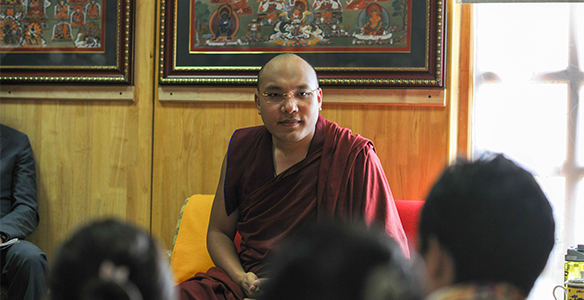
28 June 2013, Gyuto Monastery – Dharamsala
The Gyalwang Karmapa today met with students from the Edinburgh University Tibet Society, offering them practical and skillful guidance on dealing with the inner challenges encountered when working for the Tibet cause.
The group of 16 students, coming from countries including the United Kingdom, Norway and Japan, are visiting India in order to collaborate with the Students for a Free Tibet organization in Dharamsala.
He began by thanking the students sincerely for all their support for the Tibet cause. One of the students then explained to the Gyalwang Karmapa that those working actively for the Tibet cause are faced with very difficult and sometimes harrowing issues. “Often these issues give rise to very strong emotions,” she said, “so I am wondering how we can deal with these strong emotions in a positive way?”
In response the Gyalwang Karmapa offered several simple, practical and profound methods for coping with strong emotions when they arise. “I think that in order to deal effectively with such negative or disturbing emotions that we will encounter, we need a variety of methods or strategies to draw upon,” he began. “One method involves gaining the skill to recognize the problem with disturbed states of mind, and to see that when we are emotionally upset it’s problematic for us. Once we are able to recognize the problem with being emotionally disturbed or upset, then we can gradually and naturally distance ourselves from the habit of reacting in a disturbed way.”
Next he urged the students to look even deeper into their own minds in order to see the true nature of emotional disturbances. Doing so can bring about transformative results, he added.
“We need to find a way to deal constructively with disturbed states of mind. One technique that we have is to look directly at the nature of mental disturbances or afflictions. By confronting the nature of that disturbed state of mind, we discover that we can defuse the potency and undermine the intensity of those mental afflictions – and therefore we don’t have to follow them compulsively whenever we get upset.”
“So therefore,” he continued, “I think some of the key techniques that might be useful are firstly to recognize mental afflictions as soon as they arise, and then see if we can rest within the state of that recognition, knowing our mental disturbances for what they are and thus gaining greater freedom from them.”
The Gyalwang Karmapa then explained to the students the great value of maintaining a sense of inner awareness throughout all our daily activities, illustrating his point with a simple focus upon the breath.
“To have a sense of introspective awareness and alertness from one moment to the next is very important,” he advised. “To give you one illustration of how we might develop that quality, we all breathe. Breathing is something normal; everyone does it. And yet we don’t really take much of an interest in the fact of our ongoing breathing; we don’t really notice our breathing. So if we instead relax, and take notice of the natural flow of our breathing, that can be a condition that helps us to develop greater awareness. If we recognize our breathing and use it in that way, to develop awareness, we’ll discover how important breathing is as an essential part of our lives. In fact, we cannot live if we do not breathe.”
“We could therefore say that awareness of our breathing can become a source of happiness,” he concluded. “That’s why I would say that to develop awareness and attentiveness, presence of mind from one moment to the next is very important. But this is something that is not going to happen all at once. If we’re going to use that awareness in dealing with mental afflictions, we have to be willing to practice and develop this through training gradually.”


